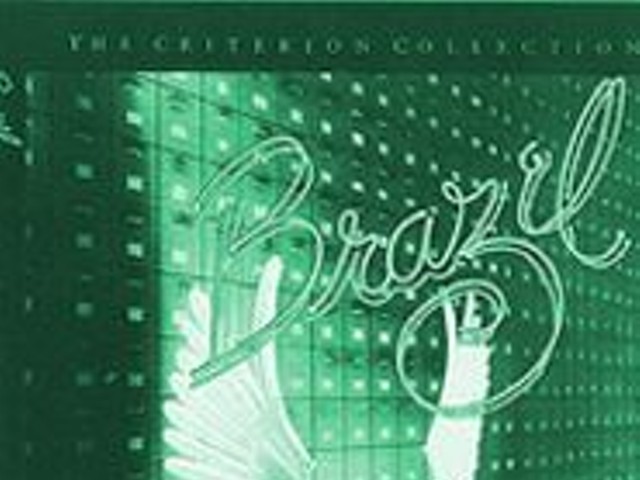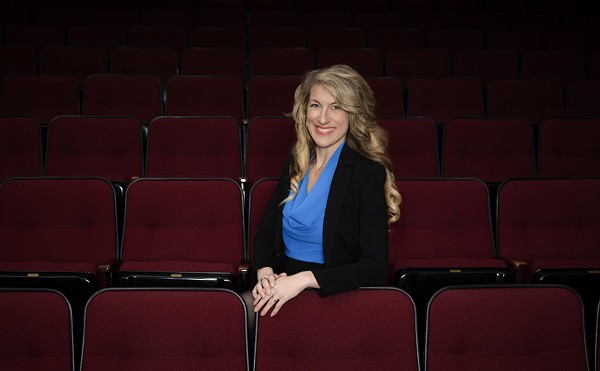All the cars seem to be heading for Fairmount Park. A security guard stands in the lot, directing drivers to parking spots.
To step into the main corridor of the grandstand is to enter another world. Everybody seems like a regular who knows exactly what he or she is doing. Some are standing at small chest-high tables, eyeing the long line of video screens that bisects the room. The monitors show the odds for the next race at this track and for a bunch of others around the country. Some bettors are sitting amid the sward of rectangular tables facing the video screens, examining the racing forms and tip sheets.
They're weighing the options, trying to be clairvoyant. The gambling faces aren't the same ones you'll find in a casino, though. The horse bettors all think they have a system -- a system under constant refinement to produce a golden mathematical formula that will yield the best bet, every time. There's a whole 20 minutes between each of the 10 races to work on the system, appeal to the muse and place bets, unlike a casino, where the game and time move faster. To figure this system requires a certain gravity, concentration, dedication. It's a dedication you won't find at most workplaces or church services. It's what the money does. To find this intensity elsewhere, you'd have to look to the face of a young heart surgeon cutting open his first chest, gravely trying not to screw up.
Many people stake out the tables in the long, gray room and stay put. They're surrounded by a wall of betting booths, snack bars, bathrooms; there's really no need to go out and look at the actual track or the horses -- it's all on the video monitors.
Every kind of person is here. The bettors look like professors, farmers, mechanics, doctors, heavy-metal dudes, soldiers on leave, high-school kids -- you name it. A man strolls by wearing a gold pendant shaped like the state of Texas with diamonds for the major cities. Three old ladies in Sunday hats and dresses, cute as can be, sit side-by-side at a table, handicapping the ponies. A coed in a way-too-tight top with an open back, shoulder blades sprinkled with body glitter, enters the grandstand with a gang of well-groomed girlfriends. A man in a wheelchair with no footrests walks himself forward, taking little steps as he sits. Another man wears a hat that declares, "The worst day fishing is better than the best day working." A father and his 10-year-old daughter look at each other as they walk back from a betting booth, grinning widely, both terribly excited to have laid money on their pick.
The buffed concrete floor will soon be littered heavily with losing betting slips, as the bad calls drop like confetti and the night wears on.
The women working the outdoor snack bar call me and everyone else "honey" and "babe." Just beyond them, the oval mile track seems huge. When the horses race down the stretch of turf farthest from the crowd, they will appear small and silent. A kid stands on a picnic table to better see the horses being led to the starting gate. Right next to him is a sign that reads, "Please do not stand on or move benches."
Not far from him sits the paddock, where the Thoroughbreds are saddled and mounted just before a race. There's not an ounce of fat on these smooth, sleek horses. They never stop moving -- they're notoriously skittish, always trying to pull their heads free of the fists clamped around their bridles and bolt away.
As the mounted horses first cross onto the track itself, the familiar "call to the post" prerace trumpet clarion -- or, at least, a recording of it -- is heard over the loudspeaker.
When the gates slam open, the bettors start yelling over the fast-paced drone of the track announcer calling the race over the PA. In the grandstand, men are barking, "Come on! Get up!" at the screens. "Don't give up!" one guy shouts again and again, as if he's trying to save all our souls. The yelling reaches a frenzied pitch as the horses near the finish line. They gallop past the bleachers, and the outdoor crowd can see the smart slap of whip on flank as the tumult approaches.
And it's over. The winning horse and jockey are led directly to the winner's circle, along with the owner and his staff, for a triumphant snapshot. That jockey earns the luxury of being ferried back to the stables in a Ford Taurus, which drives right on the dirt. The winning horse is unsaddled and walked back to the barn. The losing jockeys just ride their mounts back themselves.
The jockeys are covered from head to toe in track dirt, and the winning horse is steaming like hot iron dipped in water on this cool spring night. A family has come to watch the horses return to the stable area after their race. A friendly man in the paddock gives new racing goggles to four young sisters. They put them on and squeal with delight, running in circles. A tractor pulls a wide rake to smooth the dirt back down.
It is dark now, and the track has come alive. The betting and racing are in full swing. It feels better to gamble at night.
Soon it is time for the 10th race, the last chance to break even for the night. Or to lose it all. Or to win big, everyone is really thinking. By 11:30 p.m., it's time to go home.
Fairmount Park, 9301 Collinsville Rd., in Collinsville, Ill., has post times of 7:30 p.m Wednesday, Friday and Saturday and 1 p.m. Tuesday. Call 436-1516 or 618-345-4300 for more information.





